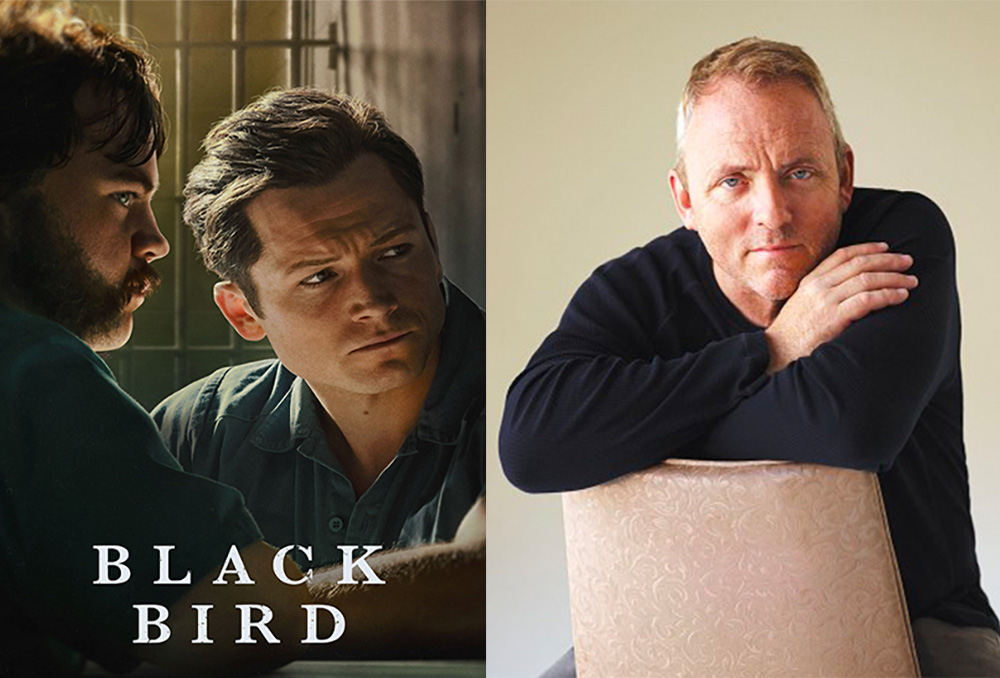
“Black Bird” showrunner Dennis Lehane discussed the making of the true crime series alongside leading actor Paul Walter Hauser, who played the convicted serial killer Larry Hall, in a journalist roundtable discussion at the Liberty Hotel on Nov. 10.
Lehane’s screenplay was based on the memoir “In with the Devil” written by James “Jimmy” Keene, a man who was sentenced to 10 years in prison, played by Taron Egerton. The show focuses on Keene’s journey to befriend Hall and get him to confess, a tradeoff that could set Keene free.
Having first premiered in July of this year, the six-episode adaptation is still one of the top 15 most popular shows on Apple TV+.
After coming across the book’s horrifying, graphic details, Lehane said he almost turned down the job.
“I didn’t want to do a show about serial killers,” Lehane said. “I don’t want to glorify them.”
In the end, he said he chose to honor the victims’ sides more and make Hall out to be “irredeemable” yet still this “human monster.”
“Jimmy Keene goes in thinking ‘Oh, I’m gonna sidle up to a monster, I’m gonna get him to tell me’ and then all of a sudden, he finds himself telling jokes with the guy, sharing stories about their upbringing, talking about their attitudes towards women,” Lehane said.
Since the book had little dialogue, he said he had to make sure he was being authentic and “keeping to the spirit” of the story.
“The other big thing was, could I look the parents of the victims in the eyes if I had to?” he said.
Hauser said personifying the character of Hall was both instinctual and aided by the script.
“It was about Dennis’ writing,” Hauser said. “All the pieces are already there, you just have to extract from it and be cognizant.”
There were subtle indications in Hauser’s performance reminding audiences of Hall’s eccentric and troubled nature. He was grossly depicted taking bites out of a sandwich from the middle, cradling it like a small harmonica — which, Lehane said, was all Hauser’s own contributions.
Hauser said while acting, he tries to think about everyday things simultaneously. As an example, Hauser described a dialogue scene with Egerton where he thought about the smell in the jail, his mother or the food he’s eating.
“Sometimes when you play a character that ilk, you feel the need to amplify certain things and really show people ‘look at what I’m doing,’” Hauser said. “But we’re catching them in their life, the audience is catching them mid-life…so there just has to be a groundedness to it.”
John Hall, a master lecturer in the College of Communication’s Department of Film and Television, said it was a “very smart and compelling show” down to the title sequence, and he was fascinated by how the story was told.
“He’s certainly a hero of mine in terms of a local writer who can really do crime,” John Hall said of Lehane.
John Hall said it was creepy how Larry Hall dug graves all his life, which was also what the title, “the black bird as a gravedigger,” ended up being a reference to.
“There’s a disturbing quality to somebody who, basically from childhood, has been forced into that,” John Hall said. “We do kind of come to understand a little bit of why he is the way he is.”
Lehane said Natalie Kingston, the show’s director of photography, fought hard for her vision, going against his want to make the production process go faster. As the story got deeper and darker, Lehane said he wanted the compositions to go from “idyllic” to “sleek,” and Kingston did it.
With her single camera, he said she made it look like “cinema… not like a TV show.”
In episode five, Lehane portrays a remarkable montage of the well lived life of Jessica Roach, one of Larry Hall’s victims played by Laney Stiebing, serving as an ode to her brief but meaningful existence.
“Bringing back the humanity of the girl in that was my absolute middle finger to Larry Hall,” Lehane said. “What created a Jessica Roach was a good life … you can kill somebody, you can’t make them un-live.”
As someone who isn’t a “micromanager” who asks for lots of takes, Lehane said, he had to trust his instincts and focus on casting.
“Cast great actors, and you don’t have to worry about it,” Lehane said. “Paul was cast not just because he’s a great actor, but because he has an inherent likability that you can’t fake, so even when he’s being creepy and nasty and weird, you’re like, ‘but he’s Larry.’”

























































































































